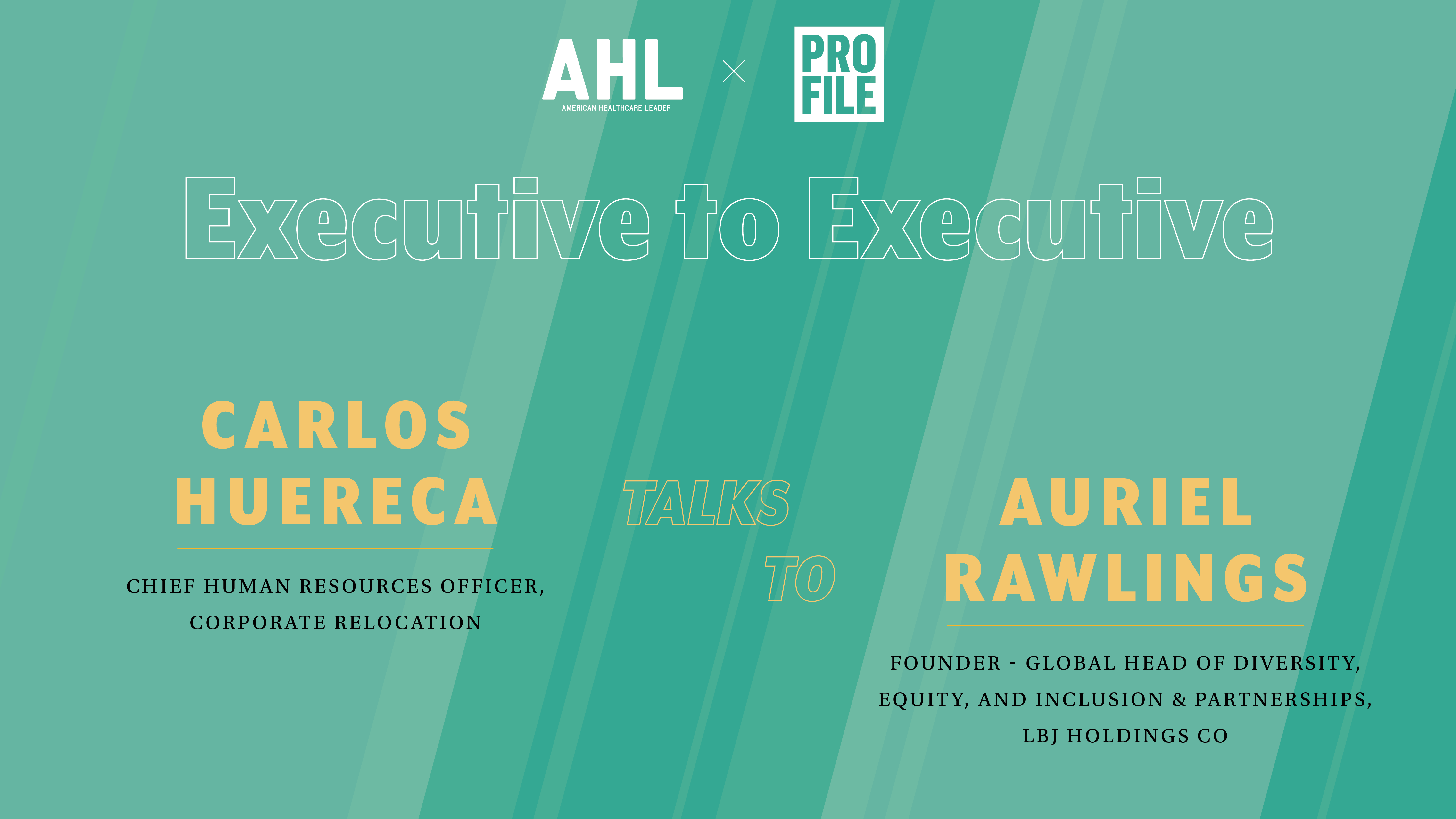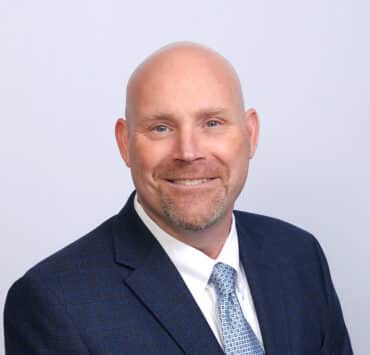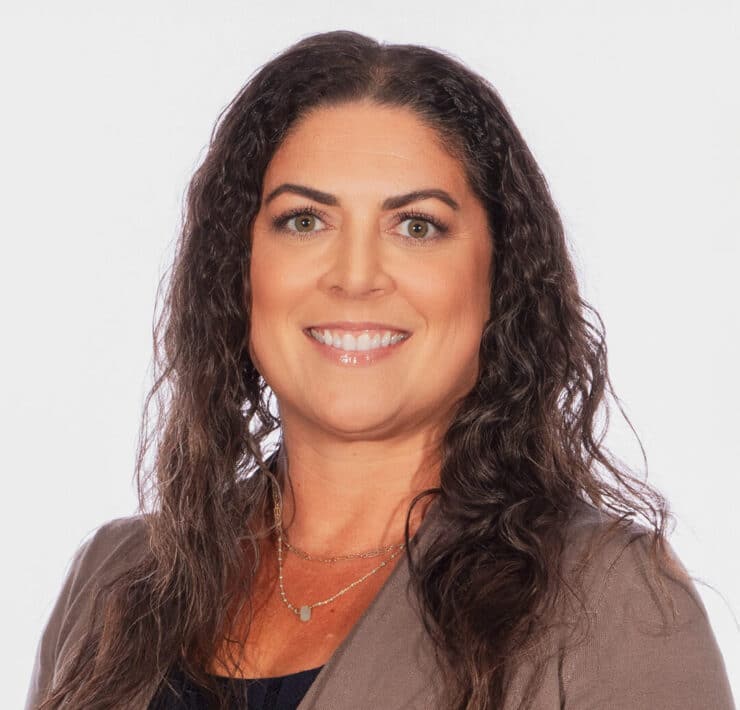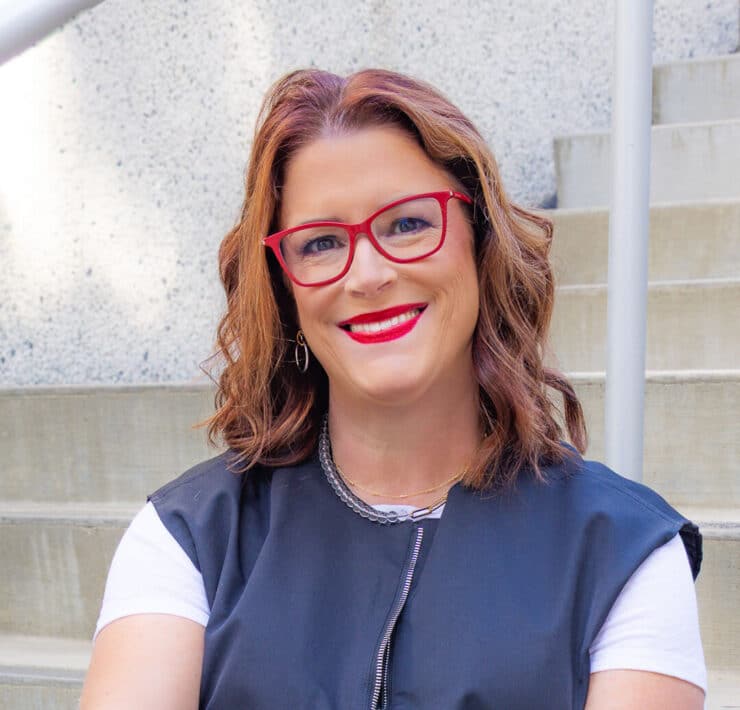
Throughout her career, Auriel Rawlings has held an important piece of advice from her mom top of mind: “You leave things better than what they were when you either came or when you joined.”
This piece of advice, as well as guidance from other inspiring leaders, guides Rawlings as global head of diversity, equity, and inclusion (DE&I) and partnerships at LBJ Holdings. Rawlings created a transformational impact during her time as regional head of human resources and DEI advisor at FedEx, where her purview included 103 countries and territories and 40,000 team members for the Asia Pacific, Middle East, and Africa regions.
“Every organization that I’ve had the opportunity to work with, this is something that I really take pride in leaving it better than how I found it and really leaving that meaningful impact and legacy behind,” she explains to Carlos Huereca, chief human resources officer at Corporate Relocation International.
Our Executive-to-Executive interviews put the power of storytelling directly into the hands of executives themselves. Through these peer-to-peer conversations, executives like Huereca and Rawlings can share key moments from their journeys, inspire future generations, and own their own stories. In turn, our audience gains a line of sight into the executive experience, as well as direct insight into what leaders around the world are really thinking and talking about.
In the second of three executive-to-executive interviews, Huereca spoke with Rawlings about the future of work, how organizations can retain quality talent, and how to make employees feel valued, appreciated, and understood in this global environment.
Carlos Huereca: Hello and welcome everyone. I’m Carlos Huereca, Corporate Relocation International’s CHRO, and I’m thrilled to be here with Auriel Rawlings, a diversity, equity, and inclusion champion and founder. She is currently global head of DE&I and partnerships at LBJ Holdings. Auriel, welcome and thank you for joining me.
Auriel Rawlings: Thank you for having me, Carlos.
It’s my pleasure. I also wanna take a quick moment to thank our friends from the American Healthcare Leader for hosting this interview. Alright, let’s jump right in. Auriel, why don’t we start with the moment in your career that have helped define your leadership style?
Sure, Carlos. For me, I really like to look at my career as a true evolution and life cycle when I look at the internships that I held during my college years moving on to my corporate career upon obtaining my first role. Initially, these experiences had allowed me to work with some of the best and the brightest minds, as well as leaders in the world. It was then I learned that it would be very important for me to truly obtain the strong, positive traits that I saw in each of them. So, as I’ve worked with these amazing leaders, I like to believe that I’ve obtained traits from each of them that I’ve been able to leverage and use in my leadership capacities as well as in my individual contributor roles, over the years as well.
And one thing that comes to mind, Carlos, is when I was interning for Procter and Gamble. And at the time my boss, he was a senior leader of the organization, and he had this astute keen, like very keen, eye for detail, and he was always ten steps ahead of everyone else. He illustrated that preparation really beats talent, and that my attention to detail is what would matter most as I navigated through business as well as through my corporate career. So, once I entered at AT&T, I was very fortunate there, again, to have a very inspiring leader that I reported into. And she just told me, “Ariel, you know, you have to really understand that people really don’t care how much you know until they know how much you care.”
So, you can know everything as far as business practices but really understanding the empathy and the authenticity that is required as you navigate the corporate landscape as well as working within the community. And I really do believe that that’s what has allowed me to move into a global role at such a fast pace and working with Fortune 100 companies and really having that opportunity to work in world-class companies has really allowed me to learn and develop at such a young age by allowing me to have these experiences and working with the most senior leaders of the companies that I’ve worked with. And this is what motivates me, Carlos, in my own work, having that opportunity to really create an impact and contributing towards a shared goal within the organizations that I’ve had the honor of working with and really being considered as a trusted advisor as well as a partner and leader within the business.
And I’m sure my mom would be proud because she’s always told me, “You leave things better than what they were when you either came or when you joined.” And so every organization that I’ve had the opportunity to work with, this is something that I really take pride in leaving it better than how I found it and really leaving that meaningful impact and legacy behind.
“The way that we work today isn’t the way that we worked ten years ago or even five years ago. COVID came and changed a lot of the way of how we work.”
Auriel Rawlings
Well, that’s great advice from your mom, and I think it’s so interesting that you touched on your learnings and experiences from past leaders. I actually tend to mimic a lot of the traits and leadership styles, my bosses, the people that I report to. Some of it’s intentional, I think I do it just more of a mechanism to align their style and obviously be able to align in the objectives that we have in whatever role or whatever organization that I’ve worked in the past. But I will say that I’m glad that you touched on the advice that your mom gave you because at the core, I’m absolutely a service leader, and I learned that from my parents. My parents were small business owners for over twenty years, so I was able to witness leadership in action. I saw really difficult times, I saw their successful years, but one thing that was consistent was their passion for doing the right thing for the people inside the business and outside the business. So I really love the connection there, again, about the leaders that you work with and learn from, and then that advice from your mom, I think it’s great advice. So thank you for sharing it.
Most welcome, Carlos.
We’ve talked about something in the past and what has shaped you as a leader. Why don’t we shift and talk about the future of work. Did you see that concept as a scary prospect or as a scary concept for many organizations? What’s your opinion about the future of work? Is that more of a trend, or do you see it as something much longer lasting?
So that question’s very interesting because I often get it on panels as well when I speak and I’m sure Carlos, you know many organizations would like to think the future of work is just a trend. However, most companies cannot operate remotely or drive the correct innovation that they’re seeking to drive without influencing the productivity element within their employee base. And so it’s critical that organizations lean into the ingenuity, into equity, diversity, inclusivity, and flexible work models in order to really enable agility as well as to optimize performance and productivity. The future of work for me is something that companies will definitely have to consider ongoing from an organizational business strategy perspective. The way that we work today isn’t the way that we worked ten years ago or even five years ago. COVID came and changed a lot of the way of how we work.
However, when you look at accommodations such as the hybrid or remote work models, they’re no longer an exception—they’re reality. So it’s really critical that organizations meet people where they are. I do believe that some companies have been able to really make deep connections with their employees through digital and virtual experiences. And with the right tools, these companies can achieve and collaborate more when they empower the employees with the right resources and tools. This is something that companies have to incorporate long-term in their organizational strategy as they look at how not only do they retain employees, but also how do they attract employees from a talent acquisition strategy perspective.
I think you touched on so many great points right there. We’ve constantly found ourselves in technological changes, generational changes, which is another topic that we haven’t talked about but I’m sure you’re fully aware of. As you know, the baby boomers, in the next seven to ten years, will be officially reaching retirement age. So again, technology, generational changes, and then current events that have happened. And you touched on Covid. Why don’t we talk a little bit more about another trend since you touched on Covid and just being flexible in general. You’ve heard of the concept mass resignation, or as many call it, the great resignation. I would love to hear your thoughts about how can organizations protect from losing quality talent. What can organizations do?
That’s a really good question, Carlos. So first of all, I believe that the culture doesn’t matter if it isn’t adding measurable value or an experience to the people in the organization as well as the people that you’re serving. Leaders often disagree about the value of organizational culture. Even within the same team, some get really excited about the culture and it is to the point to where they’re really driving it. And then others may feel that it’s just another distraction and then they prefer just a pure nuts and bolts of the business operations, just managing the day-to-day business as usual and they simply don’t know how to drive culture. And I’ve seen it happen on both sides.
And both extremes, Carlos, are dangerous. A culture-obsessed leader may be wasting money on tangible things that may not matter. And then another leader may say, “Hey, you know, we don’t need to really look at this because we just don’t think it makes sense.” But then the culture also suffers from an employee engagement and an employee experience aspect. I really do believe that great cultures win and retain the best talent for key reasons. And strong cultures really create employees who essentially are brand ambassadors. We’ve seen it when disgruntled employees voice their opinions, publicly. And then we’ve seen when employees who have such a positive or rich experience in the workplace also voice it publicly.
And this is what really drives employees to really remain within the business. But then also it’s what drives employees to reach out to the recruiters or the HR team vying to get an interview within organizations. And this is where you begin to see the competitiveness of candidates. You’re able to gain a higher caliber of candidates. One thing that I found interesting, and this was on a Gallup research study that was done, 71 percent of workers say that they use referrals from current employees of an organization to learn about job opportunities and the experiences. So think about that for a moment, Carlos. If the employees aren’t having a positive experience, then you won’t essentially be able to gain new talent or at least stellar talent from a talent acquisition perspective going forward.
I really believe when you have a winning culture, employees can really speak genuinely and convincingly about why the organization is a great place to work, and that naturally will attract people, but then it also retains them long-term. You have to think about ultimately when we are speaking about culture, the long-term sustainability of the organization, and I really do believe that the topic of culture is also here to stay. It’s also something when you look at the mass resignation and workplace trends long term, culture is definitely something that employees are honing more and more. So it’s really important that companies take advantage of the opportunity to really look at what the current culture is and ways to improve it ongoing.
“I really do believe that great cultures win and retain the best talent for key reasons. And strong cultures really create employees who essentially are brand ambassadors.”
Auriel Rawlings
So true. Auriel, you have a ton of experience in the global environment, great background in working with global organizations. How do you balance these, again, staying in the topic of culture, how do you balance this company culture while also taking into a town the differences in countries and continents?
I’m currently in the Middle East, and it’s really interesting when you look at the dynamic. Multinational and cross-cultural teams, Carlos, are really becoming more common. Meaning businesses can truly benefit from an increasingly diverse knowledge base and new, insightful approaches to business problems ongoing. But it’s critically important when you look at the culture as well as the cross-cultural, diversity within these teams, it’s really important that these organizations become more reflective of the communities that [they] are serving. And to serve the people and to gain additional profit and revenue, it’s important that companies understand not just the organizational culture of where the company is currently based but also the culture of the countries that they are conducting business in.
So from a communication element, attitude as well as punctuality, that’s something that I had to learn in relocating to the Middle East. I’ll never forget my first job here. It was really interesting, you began to see that in America, if we have a job interview, we’re gonna be on time, everyone in the room. However, here punctuality is not something that I would say is a business norm. It’s not abnormal for individuals to start meetings late. And it isn’t a disrespectful gesture. It’s just a different idea of what constitutes being on time. And just that small misunderstanding can sometimes lead to a negative cultural perception, but it’s just a way of life when conducting business, especially in this part of the world, it’s respected.
It’s like as soon as you show up, it’s fine. As long as you show up, it doesn’t matter the time. The business will take place whenever you decide to show up. And so just understanding those differences. And having teas and coffees in this part of the world is a really interesting dynamic, because, again, in the US we may say, “Hey, let’s grab lunch” or “Hey, let’s just meet in a conference room.” But business here is conducted over dates, teas, coffees. So it’s just really important in really understanding not just the in internal culture of the companies wherever the headquarters are based, but then also the cultural as well as the societal norms in the regions that these companies are operating in.
And then when you look back on the element of diversity and inclusion, the representation elements and factors. Ten years ago, women in the workplace in this part of the world wasn’t as common as it is in the US. And so it’s really interesting to see women also taking leadership roles and taking charge of their careers in order to progress in organizations. So it’s really interesting to see how organizations are creating pathways as well as talent development opportunities for employees, and not just women but employees holistically in order to meet them where they are in order for them to grow and to thrive within the organizations that they’re serving.
You talked about earlier about having specific measurements in place. So will that, align there then, like being intentional and really having a specific metric to have the right representation that you’re looking for in a global environment? Is that normally the way you will address that area?
Definitely. You have to be intentional. And something that comes to mind was, in one of the companies I was driving DEI, and when you look at the day-to-day for, let’s say, women in the workplace. Let’s consider a woman returning to work after giving birth. And, you say, “Okay, well, we support women in the workplace, but how do you support women in the workplace?” That’s the question that often arises. And for the women who were returning to work, we found that they don’t have a place to [pump] for their babies if they’re nursing. And so really driving that strategy, Carlos, forward to where it’s not just a lip service, but more so, really taking intentional action to show that yes, we are creating more accommodating workplaces. That we are creating programs and policies to support the well-being, as well as the progression of promotion for women in the workplaces, is really critical. And there again, it can’t just be a lip service. It has to be intentional leadership in action to ensure that the strategy also is reflective of the end game, the result. It’s a positive one to ensure that you have something to back up what you’re saying and what you’re upholding and believing in as a company.
I love that. I have a daughter who’s twelve years old, so back to your comment about leaving a place better than how you found it, I definitely have some personal attachment to DEI and just want to make sure that I can add my own value in making progress in this important topic. So back to the expectations and norms in the global environment, because I thought that was so interesting how I hadn’t even thought about, you know, how coffee and tea could be so important in this global setting. Can you maybe share more about how you make employees feel valued, appreciated, and understood in this global environment?
I would first start off going back to the statement, “people don’t care how much you know until they know how much you care.” When you look at ensuring that employees feel valued, first of all, Carlos, the key trait I believe that any leader should have, especially when you’re taking DEI into account, is the power of listening. Especially, and I mentioned with the DEI strategy, a lot of the strategy is created from listening to the people. Of course, you have employee surveys that may gauge employee satisfaction year over year. But real, intentional listening where a company may be able to host focus groups to really hear the true challenges that employees may be facing, whether they’re on the front line in the corporate space, as an individual contributor, as a manager, as well as a senior officer within the organization.
And that’s something that I really hone into when working with my teams is ensuring that the people feel valued by me listening to them. And not only once I listen, it’s my job to take action to ensure that based on what they’ve shared with me, I go back, I look at the drawing board, and I put a solution together for the organization to ensure that what we’re doing from a DEI element also supports the business strategy long term. And which leads me to my next area: the appreciation element. So as a leader, that’s something there again, Carlos, that I value. My teams will tell you a thousand percent showing individuals that you are appreciative of what they do each day. And it doesn’t have to always a monetary appreciation.
Of course, I’m sure people would love that if every time you were appreciated in the business, you receive a bonus or some type of compensation for that. But there again, outside of that really showing and being genuine in the recognition approach that’s taken internally, whether it may be a kudos from a senior leader or even, “Hey, I saw what you did on this project and I really would like to give you the opportunity to now lead something bigger.” Just calling out that appreciativeness as a leader from a DEI element also drives more productivity from the employees because they feel empowered. They feel like you’re enabling them to do something that that they may have not been able to do before.
And something that comes to mind was there was a project that I had worked on at some point, and there was a young woman who had an idea. And the idea was brilliant. She had began to tell me, “Auriel, I’ve had this idea for several years. And every time I try to bring it up to management or senior leaders, it’s shut down.” And there again I took the idea—not taking the credit but giving this young lady the platform to present it. And it was a win for the business. That’s where you begin to see the magic happen in listening to the employees, recognizing them for their efforts, and really taking forward, the ideas that they may have or, really considering the challenges that may be being faced within the business to understand as an organization. How can you improve the way that you’re currently working? And how can you holistically make the employee experience much better from not just a day-to-day element, but also from a compliance aspect as well?
“If the HR leadership or the HR function does not have that empathetic trait, then how can you expect the rest of the functions to also reflect that warmth that you’re looking for within the organizational cultures?”
Auriel Rawlings
I love it. Great insight, Auriel. I love when you said, so not only listening to the employees but actually doing something with the information you are gathering from definitely the people you work with. Because then it could actually work against us as leaders if we are seeking feedback, but then we don’t do anything with it. It goes back to your comment about why are they being genuine about what they’re saying? Do they truly care if I’m giving them feedback or I’m sharing what I need, the obstacles I’m facing or the aspirations that I have, but there’s truly no action after that. So I love how you connected the importance of listening and taking action, being intentional and being genuine about caring for the people that you work with. Because people can also tell when you’re saying thank you just to say thank you or you’re truly saying thank you from the bottom of your heart. I appreciate what you’re doing. People can read that. What about a skill that you think it’s more needed in the space, in the field of HR now than ever before? What would be your opinion on that?
So Carlos, I’m sure you’re aware, from a global landscape, we’re seeing layoffs happen across many sectors if organizations and with that HR leadership really has to take on a more empathetic approach. As you work through these challenges and transformations within the business while it supports the business strategy, it has to happen at some point in some companies. Having that empathy and really leading with empathy from, not just the HR leaders but the leaders across the business. I believe that you get different flavors of HR depending on what company you’re in as well as what region you may be in. I’ve seen it to where HR in some organizations, they have it, they get it.
There’s a positive human element when it comes to HR. But then I’ve also seen on the other side where in the HR space, HR is really feared, and that is concerning as well. Because with HR being a people function, there should not be fear when you see your HR leader walk into the room or if an HR business partner is asking you for a meeting, you shouldn’t be fearful. So there again, when you look at a skill or quality that I believe is required for those in HR leadership right now, it’s definitely the empathetic, approach that’s taken as you support the business. Whether it’s through talent management, talent acquisition, as well as governance and compliance, learning, and development.
There has to be an empathetic approach from an HR perspective. And I do believe that empathy as well as the authenticity—we keep speaking about authenticity; that’s what really brings that true human element to the business. And I like to believe that HR is the lifeline for organizations because there again, it’s like the heart that pumps the blood into the other functions. And so if the HR leadership or the HR function does not have that empathetic trait, then how can you expect the rest of the functions to also reflect that warmth that you’re looking for within the organizational cultures? That’s the one trait right now that I would definitely say it’s important for HR leadership to possess.
That’s great. It’s absolutely showing that human element in human resources, right? And I agree with you. I think the HR business partner should be a business partner. When I was starting my career a long, long time ago, I remember those years when I was working with my colleagues and they were like, “Oh no, you definitely don’t want to go to the HR office or talk to an HR business partner.” We saw it as, oh, you’ll be getting in trouble if you’re having that type of conversation.” But fast forward to present times, HR should be a business partner for an organization and obviously a critical function inside any organization that should foster collaboration, communication, and that empathy that you’re talking about. So, great answer. Thank you.
I wrote down one last question for you, Auriel. You’ve shared strategy and advice with the World Expo 2020, the US Department of State, the United Nations Women’s Organization, and the US Trade Commission. Is HR expertise having a moment? And if so, why?
Whoa, that’s a loaded question. [laughs]
Your background and learning more about you, I was really impressed when I learned the type of work that you’ve done. So I’m definitely writing these questions down.
Thank you. Thank you. So, I mean, long story short, I would definitely say HR is—well, let me rephrase it. I wouldn’t say that HR is having an expertise moment, but what I will say is the way that organizations are working and the way that they will work for years to come is heavily reliable upon that in which HR brings to the business. Organizations are looking at how can they improve cross-functional collaboration, how can they make the workplaces more accommodating to team members. And not just women holistically, but also people of all genders or non-gender. So it’s really important as you look at the trajectory of companies from years to come. You mentioned that when we opened today, Carlos, the general generational makeup, of the organizations and what’s important and critical in order to not only retain talent but also acquire talent ongoing.
“It’s my job to take action to ensure that based on what they’ve shared with me, I go back, I look at the drawing board, and I put a solution together for the organization.”
Auriel Rawlings
Companies are really trying to ensure that they have those synergies, right, to continue to have that people element because, again, people are the greatest assets to the businesses that they’re serving in order to ensure that they’re able to provide their services or products to the end consumer. So when you look at HR as a function, there’s so many different areas that HR is now responsible for, not just from an employee experience aspect but also from the way the organization is positioned from a people strategy element, both internally as well as externally. And so you look at how do we leverage a more equitable workplace when we look at our policies and procedures, how do we ensure that were incorporating diversity? And there again, I know when we speak about diversity, Carlos, sometimes it’s just people immediately think of just race.
But diversity is far beyond race. Everyone is diverse in their own unique way, essentially. So again, how do workplaces ensure that they’re incorporating that into their people strategy? And companies are really taking the time to study and understand this long term. Because there again, what millennials may look for isnt something that the baby boomers maybe wouldn’t have gone for previously. And then when you look at generations like Gen Y and Z, it’s completely different. So how do you keep up with that trend as well as how do you keep up with what would be an attractive way to work to ensure that people are productive, they’re efficient, and ultimately that they’re happy within the workplace? There have been several studies that have been done to where they so show that 71 percent of employees are disengaged on a daily basis in the workplace. So how you create a more engaged workforce long term is what’s happening within the HR space, Carlos. So all of these elements are very critical to the success of the organizations within the HR function.
Very insightful. Auriel Rawlings, global head of D&I and partnerships at LBJ Holdings. Thank you for your passion. Thank you for caring and thank you for your time.
Thank you, Carlos. It’s been a pleasure.












